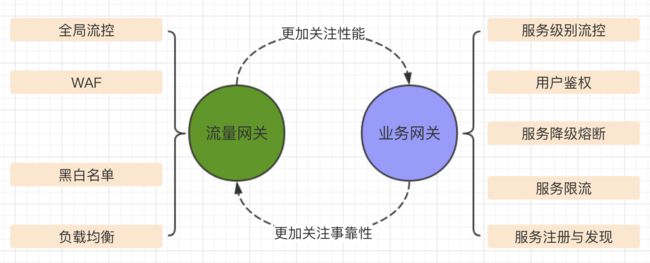这里所指的分流插件非常类似于nginx的流量转发功能,或者叫反向代理。
背景
尽管nginx的流量转发功能也很强大,但业务上的一些变化有可能出现会让nginx的配置繁多,疲于应付,比如:某款APP随业务发展演化出众多业务线:酒店业务线,机票业务线,餐饮业务线,本地出行业务线。这些业务线的背后往往是不同的部门,不同的技术团队组成,因此会提供不同的服务供APP对接,如果每增加一个新服务都需要去nginx做配置,nginx的配置会随着业务的发展时间的推移变得沉重难以维护。因此我们可以将nginx定义为流量性的网关,与具体的业务无关,只负责基于域名的请求转发,而后端业务线的不同服务的不同由业务网关负责。
另外就是对服务进行逻辑分组的需求,比如将一些重要的请求划分到一组服务器,这组服务器是高性能的;其它边缘业务的请求划分的另外一组服务器,这组服务器配置相对低。再比如我们的灰度环境,均需要基本一定的规则来分配流量。
方案
捕获WebFlux的流量,然后后台将请求转发到相应服务,最后将响应的结果返回给客户端。
实现
捕获流量
实现自定义的WebHandler,
@Override
public Mono handle(final ServerWebExchange exchange) {
return new DefaultDiabloPluginChain(plugins).execute(exchange);
} 实现一个插件职责链,调用不同的插件最终返回响应结果。
private static class DefaultDiabloPluginChain implements DiabloPluginChain {
private int index;
private final List plugins;
DefaultDiabloPluginChain(final List plugins) {
this.plugins = plugins;
}
@Override
public Mono execute(final ServerWebExchange exchange) {
if (this.index < plugins.size()) {
DiabloPlugin plugin = plugins.get(this.index++);
try {
return plugin.execute(exchange, this);
} catch (Exception ex) {
log.error("DefaultDiabloPluginChain.execute, traceId: {}, uri: {}, error:{}", exchange.getAttribute(Constants.CLIENT_RESPONSE_TRACE_ID), exchange.getRequest().getURI().getPath(), Throwables.getStackTraceAsString(ex));
throw ex;
}
} else {
return Mono.empty(); // complete
}
}
}
分流插件实现
public class DividePlugin extends AbstractDiabloPlugin {
private final UpstreamCacheManager upstreamCacheManager;
private final WebClient webClient;
public DividePlugin(final LocalCacheManager localCacheManager, final UpstreamCacheManager upstreamCacheManager, final WebClient webClient) {
super(localCacheManager);
this.upstreamCacheManager = upstreamCacheManager;
this.webClient = webClient;
}
@Override
protected Mono doExecute(final ServerWebExchange exchange, final DiabloPluginChain chain, final SelectorData selector, final RuleData rule) {
final RequestDTO requestDTO = exchange.getAttribute(Constants.REQUESTDTO);
final String traceId = exchange.getAttribute(Constants.CLIENT_RESPONSE_TRACE_ID);
final DivideRuleHandle ruleHandle = GsonUtils.getInstance().fromJson(rule.getHandle(), DivideRuleHandle.class);
String ruleId = rule.getId();
final List upstreamList = upstreamCacheManager.findUpstreamListByRuleId(ruleId);
if (CollectionUtils.isEmpty(upstreamList)) {
log.warn("DividePlugin.doExecute upstreamList is empty, traceId: {}, uri: {}, ruleName:{}", traceId, exchange.getRequest().getURI().getPath(), rule.getName());
exchange.getResponse().setStatusCode(HttpStatus.SERVICE_UNAVAILABLE);
return chain.execute(exchange);
}
final String ip = Objects.requireNonNull(exchange.getRequest().getRemoteAddress()).getAddress().getHostAddress();
DivideUpstream divideUpstream =
LoadBalanceUtils.selector(upstreamList, ruleHandle.getLoadBalance(), ip);
if (Objects.isNull(divideUpstream)) {
log.warn("DividePlugin.doExecute divideUpstream is empty, traceId: {}, uri: {}, loadBalance:{}, ruleName:{}, upstreamSize: {}", traceId, exchange.getRequest().getURI().getPath(), ruleHandle.getLoadBalance(), rule.getName(), upstreamList.size());
exchange.getResponse().setStatusCode(HttpStatus.SERVICE_UNAVAILABLE);
return chain.execute(exchange);
}
if (exchange.getAttributeOrDefault(Constants.GATEWAY_ALREADY_ROUTED_ATTR, false)) {
log.warn("DividePlugin.doExecute alread routed, traceId: {}, uri: {}, ruleName:{}", traceId, exchange.getRequest().getURI().getPath(), rule.getName());
exchange.getResponse().setStatusCode(HttpStatus.FORBIDDEN);
return chain.execute(exchange);
}
exchange.getAttributes().put(Constants.GATEWAY_ALREADY_ROUTED_ATTR, true);
exchange.getAttributes().put(Constants.GATEWAY_CONTEXT_UPSTREAM_HOST, divideUpstream.getUpstreamHost());
exchange.getAttributes().put(Constants.GATEWAY_CONTEXT_RULE_ID, ruleId);
HttpCommand command = new HttpCommand(exchange, chain,
requestDTO, divideUpstream, webClient, ruleHandle.getTimeout());
return command.doHttpInvoke();
}
public SelectorData filterSelector(final List selectors, final ServerWebExchange exchange) {
return selectors.stream()
.filter(selector -> selector.getEnabled() && filterCustomSelector(selector, exchange))
.findFirst().orElse(null);
}
private Boolean filterCustomSelector(final SelectorData selector, final ServerWebExchange exchange) {
if (selector.getType() == SelectorTypeEnum.CUSTOM_FLOW.getCode()) {
List conditionList = selector.getConditionList();
if (CollectionUtils.isEmpty(conditionList)) {
return false;
}
// 后台初始定义为host且表达式为 =
if (MatchModeEnum.AND.getCode() == selector.getMatchMode()) {
ConditionData conditionData = conditionList.get(0);
return Objects.equals(exchange.getRequest().getHeaders().getFirst("Host"), conditionData.getParamValue().trim());
} else {
return conditionList.stream().anyMatch(c -> Objects.equals(exchange.getRequest().getHeaders().getFirst("Host"), c.getParamValue().trim()));
}
}
return true;
}
@Override
public String named() {
return PluginEnum.DIVIDE.getName();
}
@Override
public Boolean skip(final ServerWebExchange exchange) {
final RequestDTO body = exchange.getAttribute(Constants.REQUESTDTO);
return !Objects.equals(Objects.requireNonNull(body).getRpcType(), RpcTypeEnum.HTTP.getName());
}
@Override
public PluginTypeEnum pluginType() {
return PluginTypeEnum.FUNCTION;
}
@Override
public int getOrder() {
return PluginEnum.DIVIDE.getCode();
}
}
WebClient
将http请求转发出去,主要依赖WebClient,它提供了响应式接口。具体的操作封装在HttpCommand工具类中,核心代码如下:
public Mono doHttpInvoke() {
URI uri = buildRealURL(divideUpstream, exchange);
traceId = exchange.getAttribute(Constants.CLIENT_RESPONSE_TRACE_ID);
if (uri == null) {
log.warn("HttpCommand.doNext real url is null, traceId: {}, uri: {}", traceId, exchange.getRequest().getURI().getPath());
exchange.getResponse().setStatusCode(HttpStatus.SERVICE_UNAVAILABLE);
return chain.execute(exchange).then(Mono.defer(() -> Mono.empty()));
}
// 后续有时间再加 todo 没有清除掉
// IssRpcContext.commitParams(IssRpcContextParamKey.TRACE_ID, traceId);
if (requestDTO.getHttpMethod().equals(HttpMethodEnum.GET.getName())) {
return webClient.get().uri(f -> uri)
.headers(httpHeaders -> {
httpHeaders.add(Constants.TRACE_ID, traceId);
httpHeaders.addAll(exchange.getRequest().getHeaders());
})
.exchange()
// 默认doOnError异常会传递
.doOnError(e -> log.error("HttpCommand.doHttpInvoke Failed to webClient get execute, traceId: {}, uri: {}, cause:{}", traceId, uri, Throwables.getStackTraceAsString(e)))
.timeout(Duration.ofMillis(timeout))
.flatMap(this::doNext);
} else if (requestDTO.getHttpMethod().equals(HttpMethodEnum.POST.getName())) {
return webClient.post().uri(f -> uri)
.headers(httpHeaders -> {
httpHeaders.add(Constants.TRACE_ID, traceId);
httpHeaders.addAll(exchange.getRequest().getHeaders());
})
.contentType(buildMediaType())
.body(BodyInserters.fromDataBuffers(exchange.getRequest().getBody()))
.exchange()
.doOnError(e -> log.error("HttpCommand.doHttpInvoke Failed to webClient post execute, traceId: {}, uri: {}, cause:{}", traceId, uri, Throwables.getStackTraceAsString(e)))
.timeout(Duration.ofMillis(timeout))
.flatMap(this::doNext);
} else if (requestDTO.getHttpMethod().equals(HttpMethodEnum.OPTIONS.getName())) {
return webClient.options().uri(f -> uri)
.headers(httpHeaders -> {
httpHeaders.add(Constants.TRACE_ID, traceId);
httpHeaders.addAll(exchange.getRequest().getHeaders());
})
.exchange()
.doOnError(e -> log.error("HttpCommand.doHttpInvoke Failed to webClient options execute, traceId: {}, uri: {}, cause:{}", traceId, uri, Throwables.getStackTraceAsString(e)))
.timeout(Duration.ofMillis(timeout))
.flatMap(this::doNext);
} else if (requestDTO.getHttpMethod().equals(HttpMethodEnum.HEAD.getName())) {
return webClient.head().uri(f -> uri)
.headers(httpHeaders -> {
httpHeaders.add(Constants.TRACE_ID, traceId);
httpHeaders.addAll(exchange.getRequest().getHeaders());
})
.exchange()
.doOnError(e -> log.error("HttpCommand.doHttpInvoke Failed to webClient head execute, traceId: {}, uri: {}, cause:{}", traceId, uri, Throwables.getStackTraceAsString(e)))
.timeout(Duration.ofMillis(timeout))
.flatMap(this::doNext);
} else if (requestDTO.getHttpMethod().equals(HttpMethodEnum.PUT.getName())) {
return webClient.put().uri(f -> uri)
.headers(httpHeaders -> {
httpHeaders.add(Constants.TRACE_ID, traceId);
httpHeaders.addAll(exchange.getRequest().getHeaders());
})
.contentType(buildMediaType())
.body(BodyInserters.fromDataBuffers(exchange.getRequest().getBody()))
.exchange()
.doOnError(e -> log.error("HttpCommand.doHttpInvoke Failed to webClient put execute, traceId: {}, uri: {}, cause:{}", traceId, uri, Throwables.getStackTraceAsString(e)))
.timeout(Duration.ofMillis(timeout))
.flatMap(this::doNext);
} else if (requestDTO.getHttpMethod().equals(HttpMethodEnum.DELETE.getName())) {
return webClient.delete().uri(f -> uri)
.headers(httpHeaders -> {
httpHeaders.add(Constants.TRACE_ID, traceId);
httpHeaders.addAll(exchange.getRequest().getHeaders());
})
.exchange()
.doOnError(e -> log.error("HttpCommand.doHttpInvoke Failed to webClient delete execute, traceId: {}, uri: {}, cause:{}", traceId, uri, Throwables.getStackTraceAsString(e)))
.timeout(Duration.ofMillis(timeout))
.flatMap(this::doNext);
} else if (requestDTO.getHttpMethod().equals(HttpMethodEnum.PATCH.getName())) {
return webClient.patch().uri(f -> uri)
.headers(httpHeaders -> {
httpHeaders.add(Constants.TRACE_ID, traceId);
httpHeaders.addAll(exchange.getRequest().getHeaders());
})
.contentType(buildMediaType())
.body(BodyInserters.fromDataBuffers(exchange.getRequest().getBody()))
.exchange()
.doOnError(e -> log.error("HttpCommand.doHttpInvoke Failed to webClient patch execute, traceId: {}, uri: {}, cause:{}", traceId, uri, Throwables.getStackTraceAsString(e)))
.timeout(Duration.ofMillis(timeout))
.flatMap(this::doNext);
}
log.warn("HttpCommand doHttpInvoke Waring no match doHttpInvoke end, traceId: {}, httpMethod: {}, uri: {}", traceId, requestDTO.getHttpMethod(), uri.getPath());
return Mono.empty();
}
网关项目开源
以上内容基于业务网关的一个小模块,详细请看这里:diablo在这里
